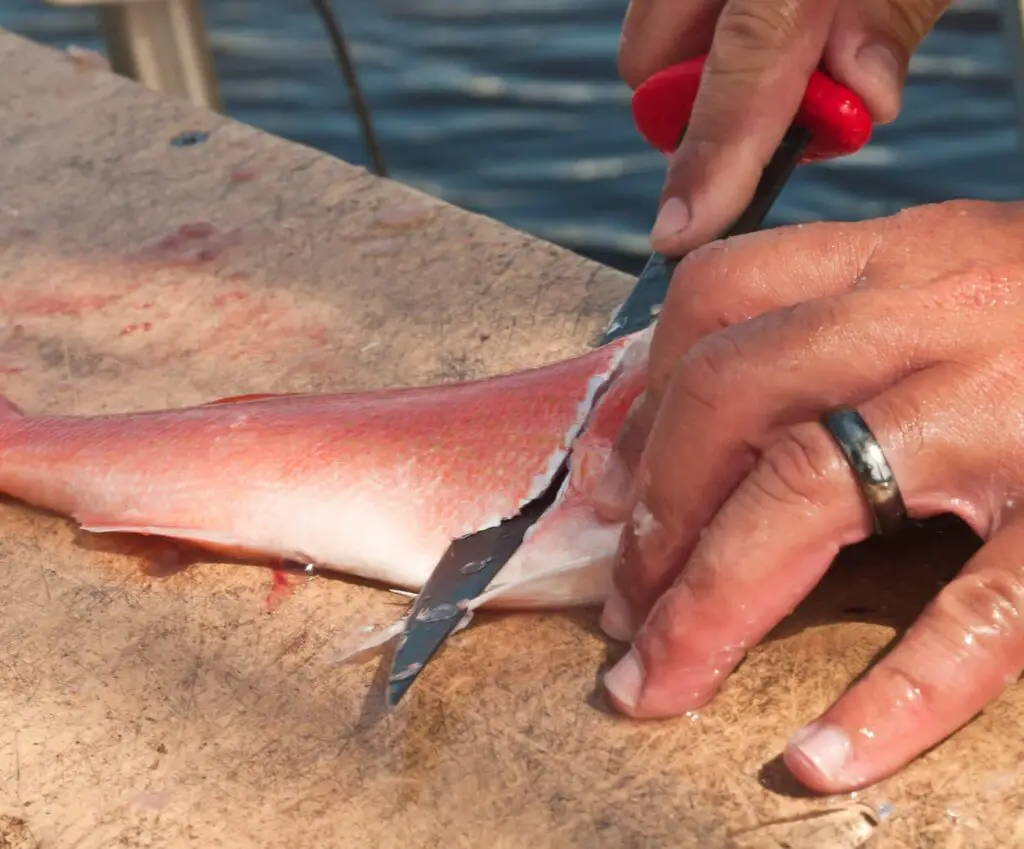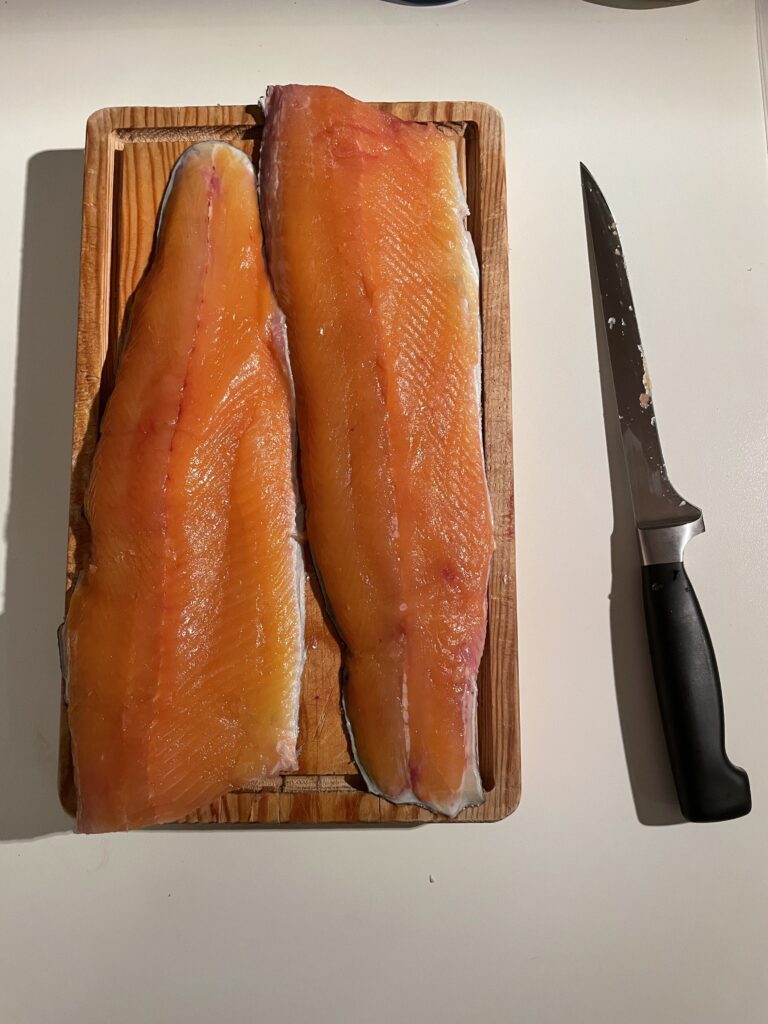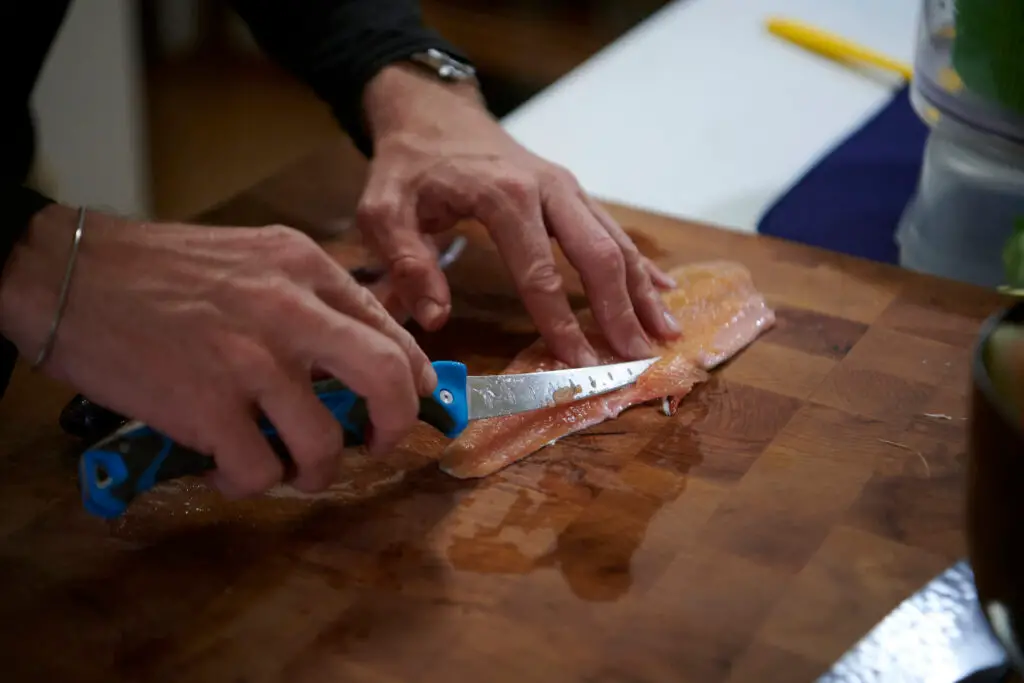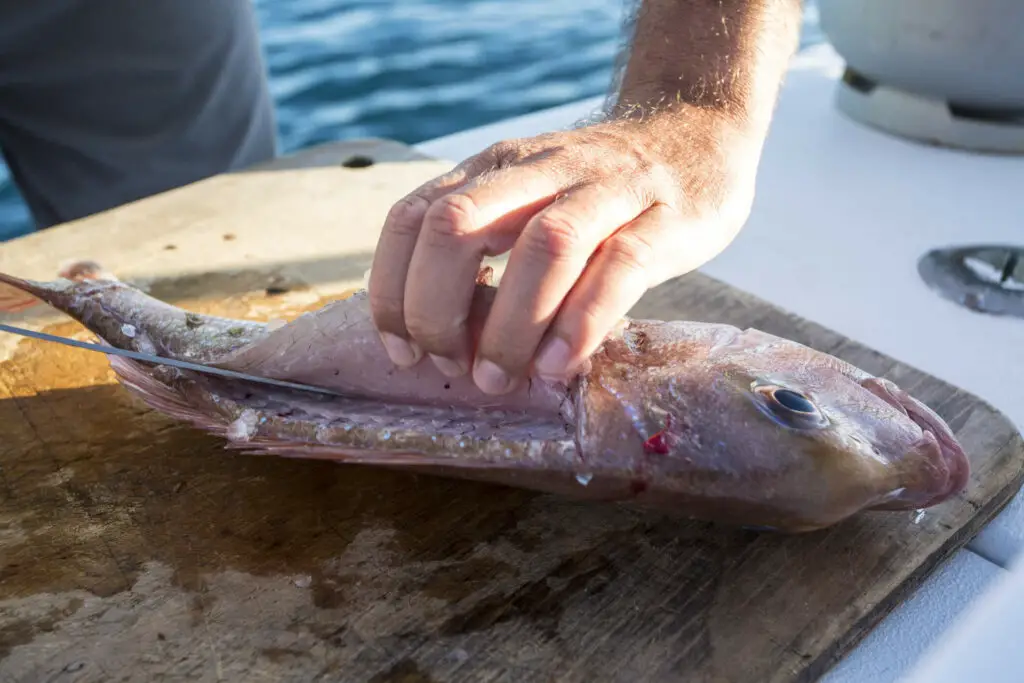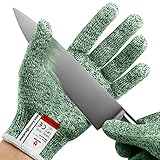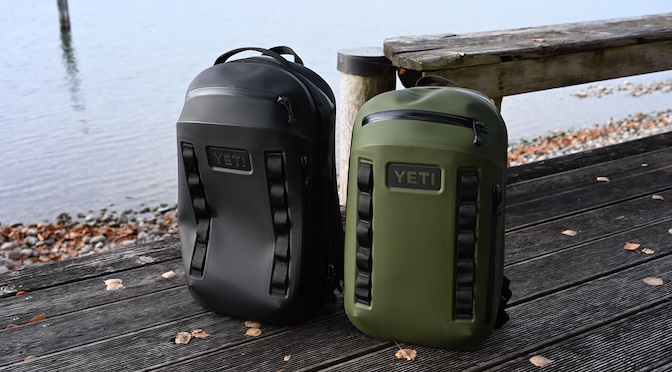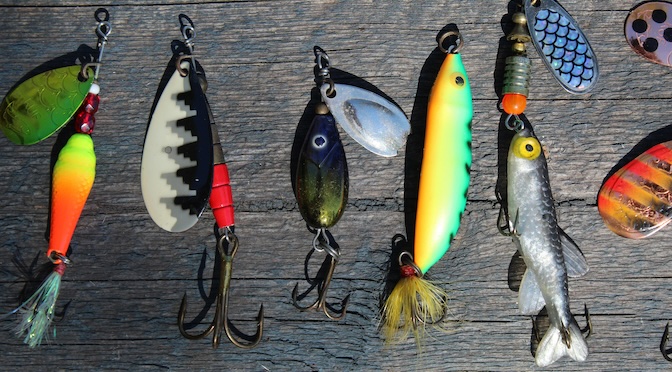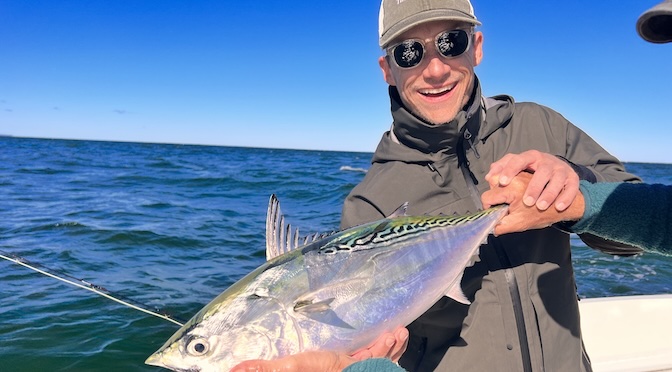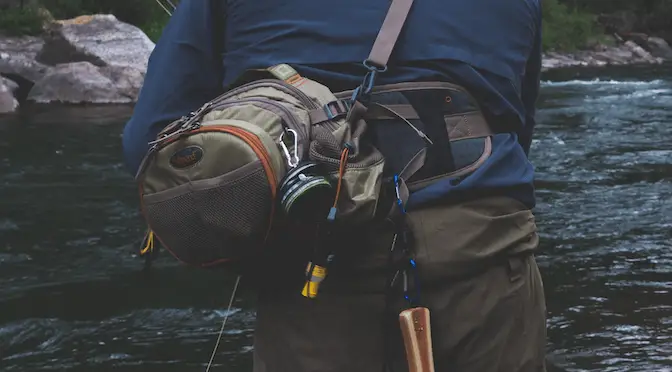Last updated on August 25th, 2025.
- Can YETI’s new backpack deliver? Thoughts on the YETI CAYO - November 20, 2025
- How to Put a Worm on a Hook: Proven Methods for a Perfect Bait - November 18, 2025
- How to Fish in a River: An Essential Guide to Proven Techniques - November 18, 2025
A fillet knife is a crucial tool when you decide to process the fish you caught.
Disclaimer: All products in this guide are independently researched by our team. We only recommend products we believe in and never get paid for the reviews. Learn more about our review process here.
When it comes to trout, I keep things pretty simple. I don’t stockpile fish in the freezer anymore—it just doesn’t feel right. Part of the beauty of trout fishing is knowing I can step into a stream just about any month of the year and bring home a couple fresh fish for dinner. That way my wife and I enjoy them at their best, and if I’ve got friends coming over, I’ll keep enough to make a bigger meal.
I’m not out there filling coolers. I keep what we’ll eat in a week, and the rest go right back into the water. Over the years, though, I’ve cleaned more trout than I can count, along with plenty of other species, and I’ve tried just about every fillet knife on the market. Keeping a sharp blade handy is second nature at this point, and it makes the whole process easier and more enjoyable. After all that time on the water and at the cleaning table, I feel pretty confident recommending knives that fit any budget and still get the job done.
OUR PICKS FOR BEST FILLET KNIVES of 2025
-
Best Overall: Bubba 9 Inch Flex
-
Best For Daily Use: Rapala4 Fish’n Fillet
-
Best Professional: Zwilling Pro 7″
-
Best Electric: Bubba Electric Corded
-
Best Classic Foldable: Opinel Slim No 12
-
Best Saltwater: Gerber Controller Folding
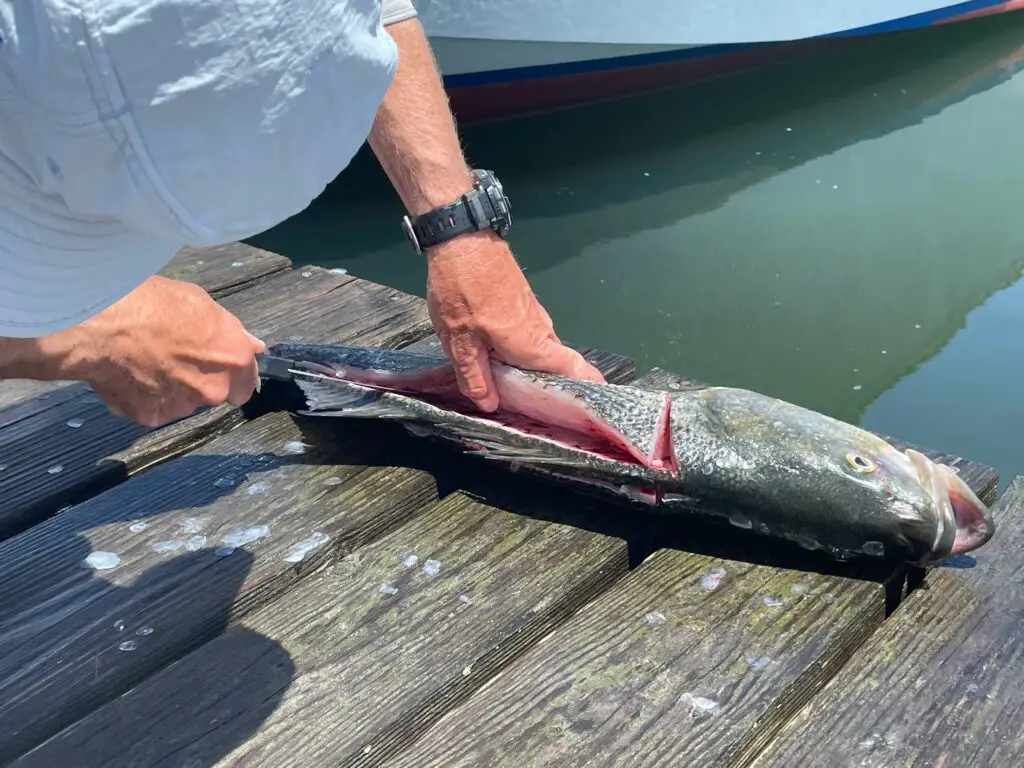
Best Overall Fillet Knife
Bubba 9 Inch Flex

Why we picked it:
The Bubba 9 Inch Flex is my top choice when it comes to the best filet knife for a certain reason: its grip. The trigger grip where the handle meets the blade adds another level of security. The blade is highly flexible and allows you to make very precise cuts. I found the Bubba’s blade to stay sharp even after filleting multiple big fish over a span of several weeks.
My favorite aspects of the Bubba:
– Extra sharp tip of the Bubba 9 Inch Flex that makes starting the cut a piece of cake.
– The Bubba is also a great choice if you want to take your knife to the water.
– Features a lanyard hole at the end of the handle and comes with a synthetic sheath for easy transport.
My Verdict: Fantastic all-around fish knife that is well equipped and thought through. Due to its outdoorsy design not the first choice for the kitchen.
Pros & Cons
PROS:
-
Fantastic, non-slip grip
-
Highly flexible blade
-
Sheath and lanyard hole included
CONS:
-
Not the most elegant for a high-end kitchen
-
Blade is not as delicate as the Wüsthof
Best for Daily Use
Rapala4 Fish’ Fillet Knife
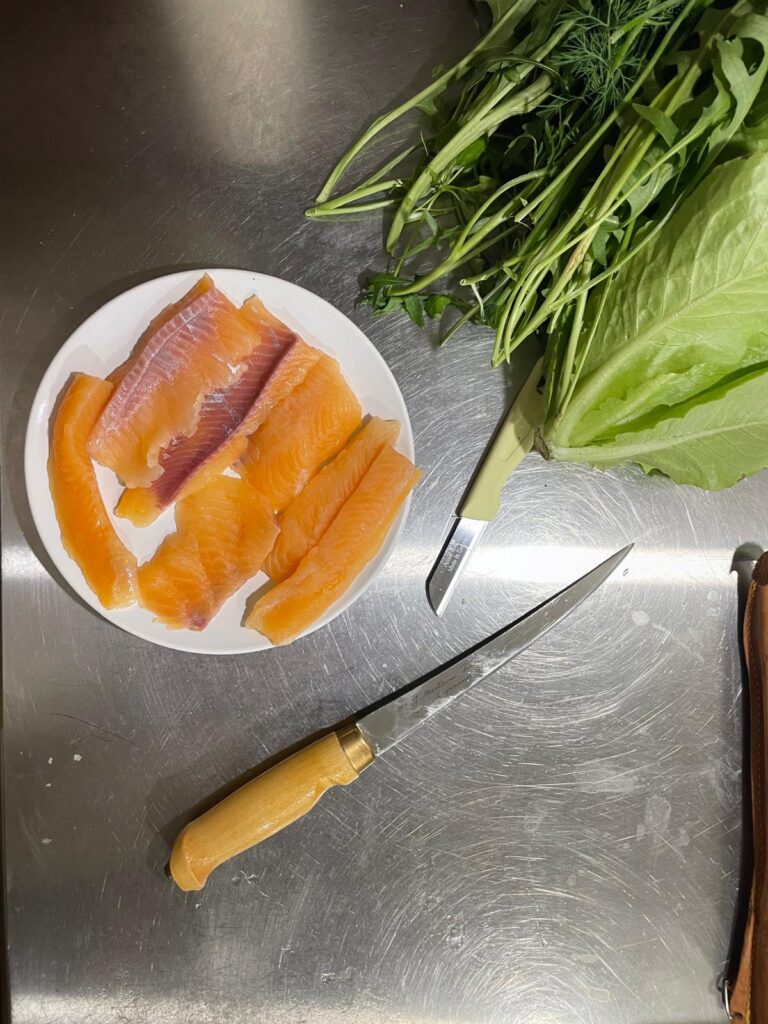
Why we picked it:
The Rapala4 Fish’n fillet knife is the right choice if you are looking for a knife to put into your tackle box. I have found the stainless steel blade by Martiini Finland to be rock solid. I have used the Rapala 4 as my go to fillet knife for many seasons and it’s still going strong. Thanks to the leather sheath it’s a great knife to bring along on any trip.
I love the highly flexible blade on the Rapala which allows me to make very precise cuts. With a little love and some occasional sharpening, this knife will last you a long time.
My Verdict:
– Best fish filet knife for everyday (outdoor) use.
– Not the one you would add to your kitchen equipment.
Pros & Cons
PROS:
-
Excellent non-slip grip
-
Set includes sheath and sharpener
CONS:
-
Outdoorsy look and feel, not ideal for elegant kitchen environment
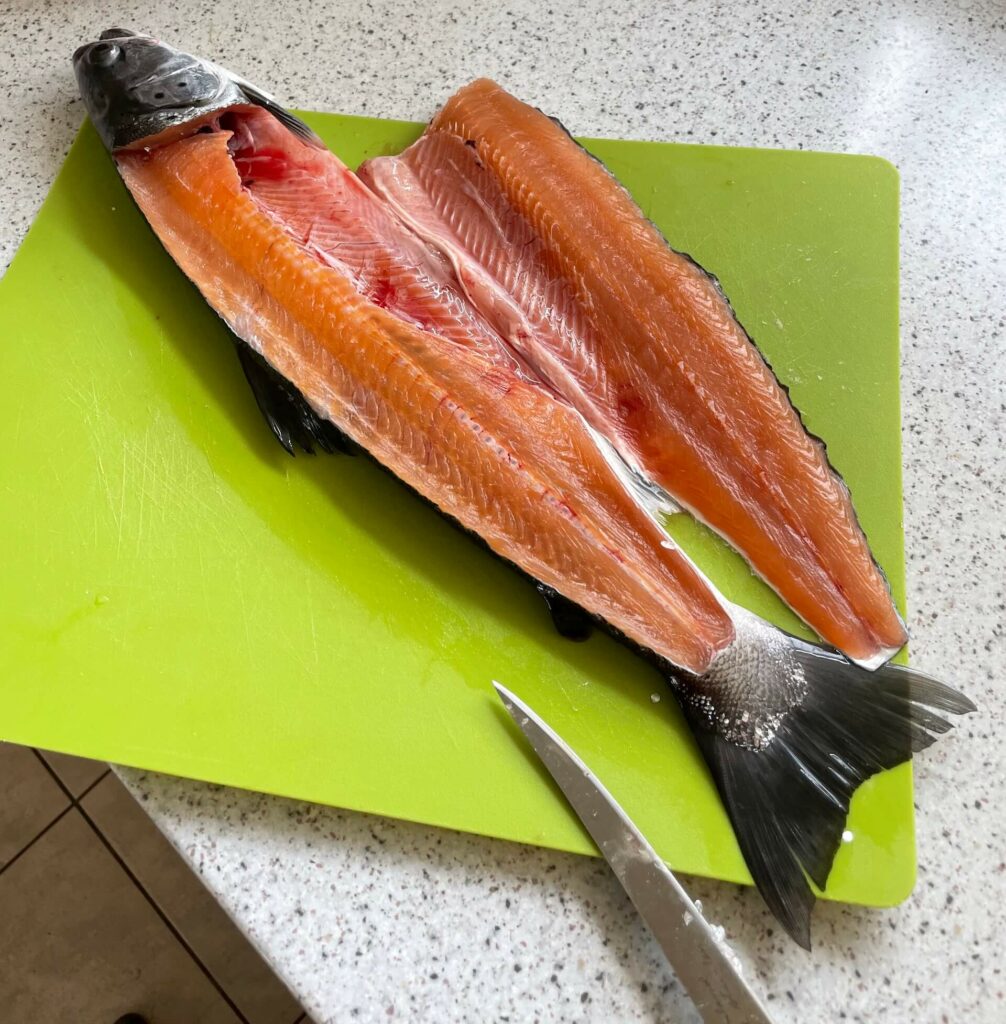
Best Professional
Zwilling Pro 7″

Why we picked it:
Zwilling has a long tradition of high quality kitchen knives: The Zwilling Pro 7″ (read our in-depth review here) is no exception to this rule. Its stainless steel blade is incredibly flexible. The knife is forged from a single piece of steel making it incredibly durable and long lasting.
The Zwilling Pro 7″ is available in multiple variations. If you’re a traditionalist, I recommend the version with the wooden handle. It comes as a 7″ or 8″ depending on your personal preference. I found the 8″ version to be a great choice if you tend to fillet bigger fish often as it makes handling larger fillets a little easier.
My Verdict:
– Elegant design with beautiful transition from blade to handle.
– Trusted by professionals and amateur chefs around the globe.
Pros & Cons
PROS:
-
Most elegant blade
-
Beautiful wooden handle
CONS:
-
Doesn’t come with a sheath
-
Knob at the end of the blade can be a bit obstructive at times
Best Electric Filleting Knife
Bubba Electric Fillet Knife Corded

Why we picked it:
The Bubba Corded has become one of my go-to knives when I’m cleaning a good pile of fish. What I really like about it is the versatility—you get four blades with different lengths and stiffness, so whether I’m working on a smaller trout or a thick-shouldered brown, I’ve got the right blade ready to go. The whole set fits neatly into the case it comes with, which makes it easy to keep organized and grab when I’m heading out for a trip.
The handle is another big plus. It’s super grippy and feels comfortable even when I’m filleting fish back-to-back. Add in the safety lock and trigger guard, and you’ve got a knife that’s not just effective but also feels secure to use. For me, it’s a solid choice if you’re leaning toward a corded electric fillet knife.
My Verdict:
– The Bubba Electric is the best electric filet knife out there in our eyes.
– If you are often filleting multiple fish, there’s no better choice.
Pros & Cons
PROS:
-
Powerful engine
-
Blades are removable
CONS:
-
Set including protective case takes up quite a bit of space
Best Foldable
Opinel Slim No 12
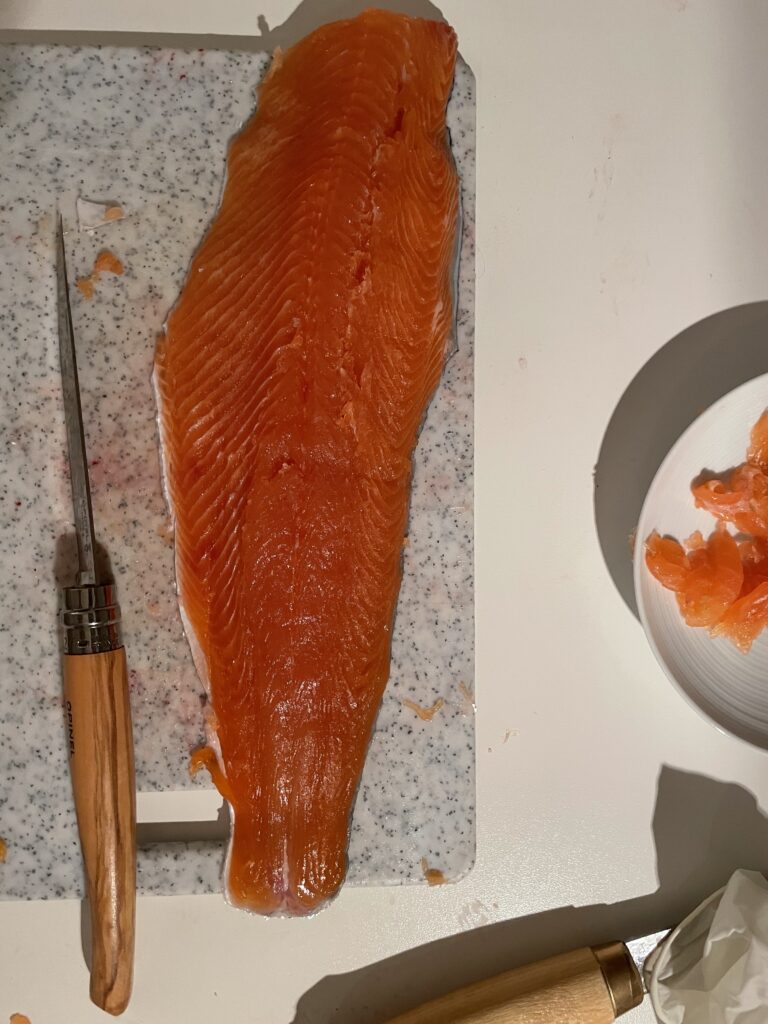
Why we picked it:
I’ve always had a soft spot for French-made knives, and Opinel is one of those brands that just gets it right. They’ve been making affordable, reliable blades for decades, and the Opinel No. 12 Slim Line (read our full review here) has become one of my favorite “on-the-go” trout knives. The fact that it folds up means I can toss it in my vest or pack without worrying about it, and when it’s time to clean a fish, it’s ready to go in seconds.
The locking mechanism gives me peace of mind too—it keeps the blade from folding in while I’m working, which matters when you’re cleaning fish by the river or around a campfire. It’s not quite as flexible as my full kitchen fillet knives back home, but it’s plenty nimble for a fresh trout on the water. If you pick one up, I’d suggest the olive wood handle. Not only does it look beautiful, but it also holds up much better to water and doesn’t soak as easily. For me, it’s the perfect blend of function, tradition, and style in a knife I can carry anywhere.
My Verdict:
– Fantastic versatility and classy looks combined.
– The No 12 size is just right for bigger fish and still folds away to a compact size.
Pros & Cons
PROS:
-
Excellent packability
-
Classy looks
CONS:
-
Blade is not as flexible as a full on kitchen fillet knife
Best Saltwater Filet Knife
Gerber Controller Folding Fillet
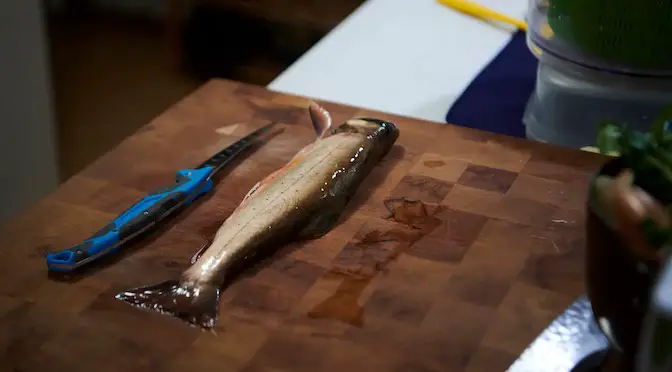
Why we picked it:
If you are a fan of saltwater species and love to fillet them on the boat or dock, make sure to check out the Gerber Gear Controller Folding Fillet (read our in-depth review here). With a folding mechanism for easy stowaway and a 6″ blade this knife ticks all the boxes of a great saltwater filet knife with an increased degree of corrosion resistance.
The handle has a smart, ergonomic shape that feels secure in my hand, even when I’m putting a little extra pressure into a cut. I like that I don’t have to worry about slipping, especially if things get wet and slimy. Another thoughtful touch is the hole at the end of the handle—you can clip on a leash so if you drop it mid-clean, you’re not watching your knife sink away. For me, that kind of detail makes it a solid all-around folding fillet knife for anglers who want something reliable and easy to carry.
My Verdict:
– Excellent choice for the saltwater fly angler due to its features
– Specifically aimed at stronger species and the availability to fold it away easily.
Pros & Cons
PROS:
-
Excellent grip that provides a lot of protection
-
Hole to attach a leash
CONS:
-
Look and feel is very outdoorsy
-
A foldable version with an 8″ blade would be a great addition to the lineup for bigger saltwater species like tuna
What to Look for in a Quality Fillet Knife for Fish
Sharpness and Blade Retention
In order to make precise cuts it is essential that the blade is sharp at all times. Funnily enough a sharper blade is also less dangerous than a blunt blade because the cuts can be performed more easily. If you feel insecure using razor sharp blades consider getting a filleting glove. Here are a couple of filleting gloves you can’t go wrong with:
Last update on 2026-02-06 / Affiliate links / Images from Amazon Product Advertising API
Blade retention is another crucial factor. It defines a knife’s ability to stay sharp over a certain amount of time. A quality one should stay sharp for a while. But over time you will eventually have to sharpen your knife using a knife sharpener. In the following paragraphs we want to give you an overview of the best knife sharpeners on the market and different options for filet knife sharpeners.
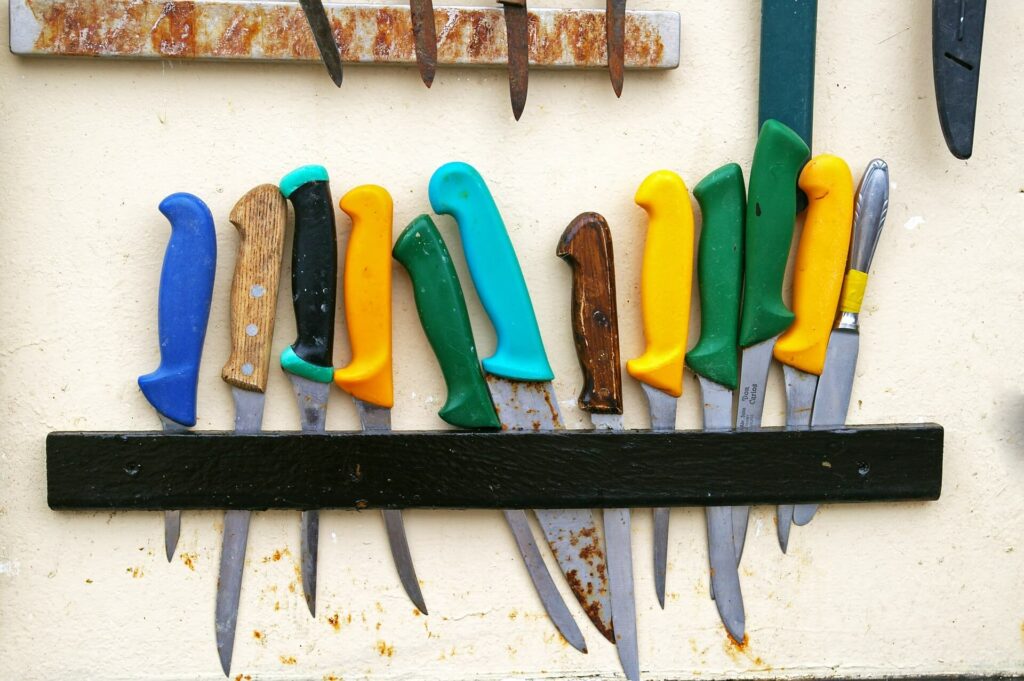
Construction of Filleting Knives
There are three characteristics that a quality filet knife blade has to fulfil: it needs to be thin, strong and yet flexible. A high quality steel (often made in Japan or made in Germany) ensures a thin and sharp blade.
Another aspect you should pay attention to is the handle. Some filleting knives are made from one piece of steel, others have handles made of plastic or wood. An ergonomic shape of the handle will ensure a tight fit and safe cutting.
Guarantee and Price
The price range of filleting knives is big. You can get started with around $25 and spend several hundred dollars if you want to. It comes down to taste and exclusivity in the end. You should look for a guarantee as fillet knives can break despite being flexible. Quality manufacturers often offer a lifetime guarantee.
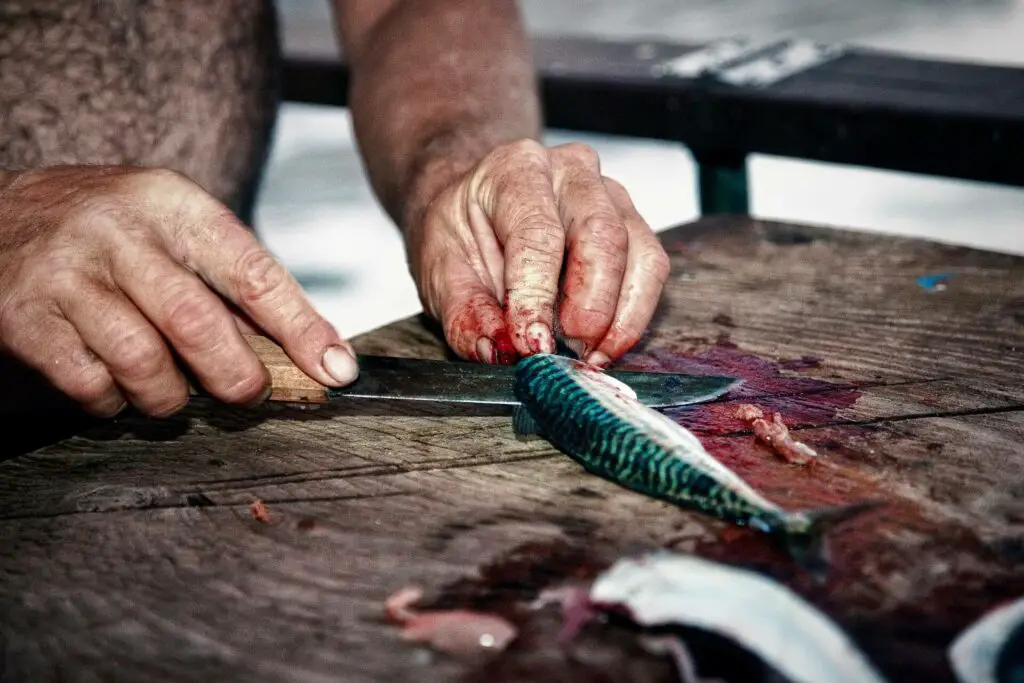
Taking Care of your Knife
Taking care of your knife is easy. Clean and dry it after every use. Store in a dry place and prevent it from dropping. Don’t use it for other purposes than filleting, it will get blunt faster. Do not put a quality knife in the dishwasher. Water and some soap is enough – dry it with a towel.
Conclusion on the Best Fillet Knives
As you can see from our test, fillet knives come in all sorts of makes, forms and shapes. You might be looking for a different type of filet knife if you are looking for one to use on a trip or outdoors.
You might be looking for a high-end knife to use in your kitchen on special occasions. No matter which one you choose in the end, all the knives in our test promise quality and longevity.
Why Trust our Expertise

Editor in Chief Leonard Schoenberger has been fly fishing all his life. After studying journalism at Columbia University and working for publications such as Forbes and Vice Magazine, he decided to found The Wading List in 2017 to cover all things fly fishing.
Frequently Asked Questions: Fillet Knives FAQs
What is a fillet knife used for?
A fillet knife (often also called filet knife or filleting knife) is used to fillet fish or meat such as poultry. Its slimmer and more flexible blade (when compared to a kitchen knife) makes it easier to make precise cuts along bones. On average a fillet’s knife blade is between 6 and 11″ (15-28cm).
Do you need a filet knife to fillet fish?
A filet knife is a great tool to cut fish such as salmon or trout. The difference between a filet knife and a normal kitchen knife is the thickness and flexibility of the blade. A fillet knife is thinner and more flexible and hence makes it easier to make precise cuts along the spine of a fish.
Is a fillet knife the same as a carving knife?
No, a fillet knife and a carving knife are different. A fillet knife has a thin, flexible blade designed for precision in filleting fish, while a carving knife has a longer, rigid blade suitable for slicing cooked meats like turkey or ham.
Who uses a fillet blade?
Fillet knives are commonly used by anglers, chefs, and individuals who prepare fish regularly. Anglers use them to fillet caught fish, and chefs use them in professional kitchens for precise filleting.
What are the two most common knives used in fish?
The two most common knives used in fish preparation are the fillet knife and the boning knife. The fillet knife is ideal for removing skin and bones, while the boning knife is designed for separating meat from bones.
Do you need a sharp knife to fillet a fish?
Yes, a sharp knife is crucial for filleting fish. A sharp blade ensures clean and precise cuts, making the filleting process more efficient and reducing the risk of injury.
What knife do the Japanese use to fillet fish?
In Japanese cuisine, a traditional knife called the “Deba” is commonly used for filleting fish. The Deba knife has a thick, durable blade that excels at cutting through fish bones.
Can you fillet fish with a regular knife?
While it’s possible to fillet fish with a regular kitchen knife, using a dedicated fillet knife is recommended for better results. Fillet knives have a specialized design, including flexibility and sharpness, which makes the filleting process smoother and more efficient.
Can you sharpen a fillet knife?
Yes, fillet knives can be sharpened. Regular maintenance, such as honing the blade with a sharpening steel or using a sharpening stone, helps keep the edge sharp. It’s important to follow the manufacturer’s guidelines for sharpening to maintain the knife’s effectiveness.
Disclaimer: If you click on one of the links in this article and end up purchasing a product we earn a small commission at no extra cost for you. Thank you!

